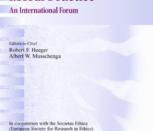Consider for a moment the course typically taken in a class discussion. A person states that he is an egoist, or a relativist, or an absolutist. These various terms are used to classify an individual according to his moral philosophy. Nietzsche has an important objection to these simplistic definitions. "Shall we still speak this way today? May we do so?" (Nietzsche 463) There are difficulties in this simplistic approach to classifying an individual. The first is that an individual is not so easily crammed into a verbal box. Sartre would say that this is a way of objectifying the person under consideration. To say that I am an egoist, or that another student is an altruist, is to imply that egoism or altruism is the essential nature of the person, and that other considerations fade into the background and become unimportant under this veil of the person's ethical philosophy. It is to equate me with egoism, or to equate the other student with relativism.
But I am more than Bob the egoist; I am also Bob the philosopher, I am Bob the student, I am Bob the coffee drinker. The name " Bob" points to a definition that is, of necessity, abbreviated. When a stranger asks me who I am, it is not possible for me to provide a complete description. But when I describe a few opinions, actions, and relationships, I do so hoping that she may view me beyond the narrow limits imposed by what I can tell her quickly.
It may be convenient to say, "But for this discussion we consider only your ethical theory." But besides objectifying the individual, this is overly simplistic because it ignores the subtle shades of meaning which exist among these philosophies. I think of myself as an egoist because I believe...


